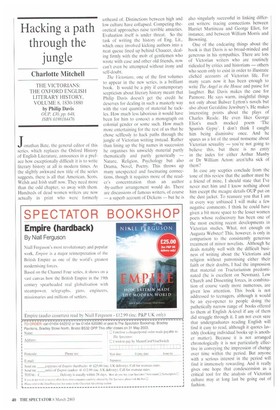Hacking a path through the jungle
Charlotte Mitchell
THE VICTORIANS: THE OXFORD ENGLISH LITERARY HISTORY, VOLUME 8, 1830-1880 by Philip Davis OUP, £30, pp. 648, ISBN 0198184476 Jonathan Bate, the general editor of this series, which replaces the Oxford History of English Literature, announces in a preface how exceptionally difficult it is to write literary history at all in modern times. As the slightly awkward new title of the series suggests, there is all that American. Scots, Welsh and Irish stuff now. They need more than the odd chapter, so away with them. Hundreds of dead women writers are now actually in print who were formerly
unheard of. Distinctions between high and low culture have collapsed. Competing theoretical approaches raise terrible anxieties. Evaluation itself is under threat. So the task of writing the history of Eng. Lit., which once involved kicking authors into a neat queue lined up behind Chaucer, dealing firmly with the mob of gentlemen who wrote with ease and other old friends, now can't even be attempted without irony and self-doubt.
The Victorians, one of the first volumes to appear in the new series, is a brilliant book. It would be a pity if contemporary scepticism about literary history meant that Philip Davis doesn't get the credit he deserves for dealing in such a masterly way with the vast quantity of material he tackles. How much less laborious it would have been for him to concoct a monograph on colonial gender or some such. How much more entertaining for the rest of us that he chose selflessly to hack paths through the jungle of Victorian writing instead. Rather than lining up the big names in succession he organises his unwieldy material partly thematically and partly generically — Nature. Religion, Psychology but also Drama, Novel, Poetry. This throws up many unexpected and fascinating connections, though it requires more of the reader's concentration than an author -by-author arrangement would do. There are discussions of famous writers, of course — a superb account of Dickens — but he is also singularly successful in linking different writers: tracing connections between Harriet Martineau and George Eliot, for instance, and between William Morris and Browning.
One of the endearing things about the book is that Davis is so broad-minded and generous in his sympathies. There are lots of Victorian writers who are routinely ridiculed by critics and historians — others who seem only to exist in order to illustrate cliched accounts of Victorian life. For many years now it has been enough to write The Angel in the House and pause for laughter. But Davis makes the case for Patmore. He says warm, insightful things not only about Bulwer Lytton's novels but also about Geraldine Jewsbury's. He makes interesting points about the plays of Charles Reade. He even likes George Eliot's much mocked poem 'The Spanish Gypsy'. I don't think I caught him being dismissive once. And he spares us a lot of the usual nonsense about Victorian sexuality — you're not going to believe this, but there is no entry in the index for either Arthur Munby or Dr William Acton: aren'tcha sick of them?
In case any sceptics conclude from the tone of this review that the author must be a friend of mine, I should state that I've never met him and I know nothing about him except the meagre details OUP put on the dust jacket. To reassure you that I am in every way unbiased I will make a few negative comments. I think he could have given a bit more space to the lesser women poets whose rediscovery has been one of the most exciting recent developments in Victorian studies. What, not enough on Augusta Webster! This, however, is only in comparison to the consistently generous treatment of minor novelists. Although he deals notably well with the difficult business of writing about the Victorians and religion without patronising either their faith or their doubts, I had the impression that material on Tractarianism predominated (he is excellent on Newman). Low Church and Dissenting forces, in combination of course vastly more numerous, are given less attention. This book is not addressed to teenagers, although it would be an eye-opener to people doing the pathetically narrow range of books offered to them at English A-level if any of them did struggle through it. I am not even sure that undergraduates reading English will find it easy to read, although it quotes lavishly (looking individual books up is another matter). Because it is not arranged chronologically it is not particularly effective in conveying the impression of change over time within the period. But anyone with a serious interest in the period will find it immensely rewarding. And it really gives one hope that condescension as a critical tool for the analysis of Victorian culture may at long last be going out of fashion.


































































 Previous page
Previous page